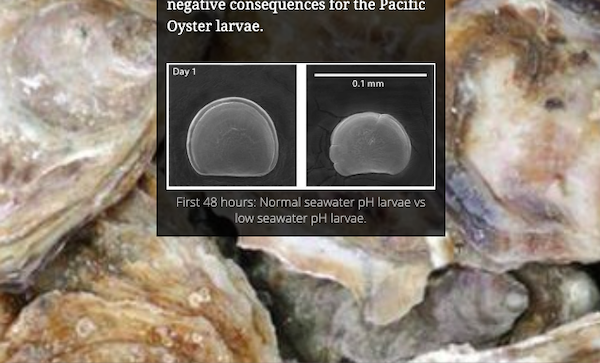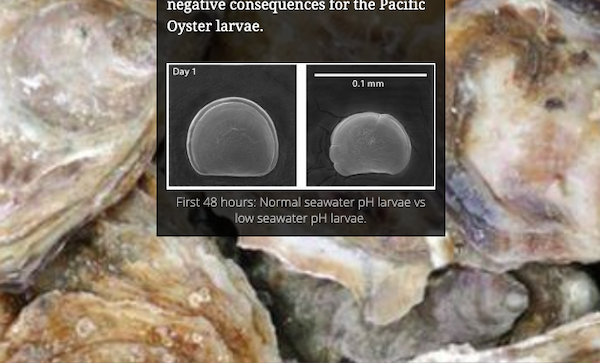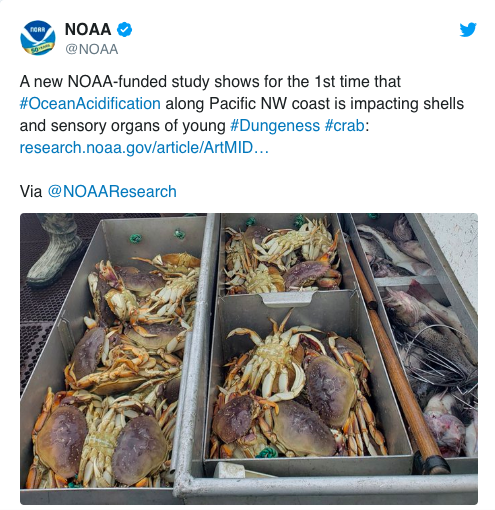
Last week was more or less the preamble to Oregon's short legislative session. Known as Legislative Committee days, this is the time before the session begins that offers opportunities to engage with legislators and hold information hearings in committee to prepare for the upcoming legislative session. And while the building was full of climate posturing, deliberations and outright threats around LC 19, the "new" carbon cap & invest bill, you likely heard nothing about the ocean climate bill that seeks to advance actions and investments to abate climate change impacts like ocean acidification to the ocean...and for good reason.
 Oyster farmers were one of the first industries to be
forced to cope directly with the impacts of ocean acidification. Lawmakers may disagree on who's to blame and will pay for climate change, but the impacts to our ocean industries are undeniable.
Oyster farmers were one of the first industries to be
forced to cope directly with the impacts of ocean acidification. Lawmakers may disagree on who's to blame and will pay for climate change, but the impacts to our ocean industries are undeniable.
Unless you've been completely asleep for the past year, you're fully aware that in an effort to reduce Oregon's carbon emissions with climate legislation, Oregon's leadership has completely fractured. Republicans and Democrats have never been so divided on an issue in my time in Oregon and during the last legislative session, this divisiveness threatened the very democratic institution of our state - Republicans left the state, the legislative session came to a complete halt and Democrats pretty much just pouted, with a few aisle-crossers taking the risk to kill a divisive bill to simply bring back order and gain a few industry nods in their district.. For myself and a few leaders in Salem, we took from that session a lot of lessons, from semantics to fear, it's remarkable how easy a good idea can go really bad fast in Salem.
Applying some of those lessons this session, Senator Arnie Roblan (D-5), has crafted and introduced SB 1554, which primarily invests in the science, adaptation and mitigation of ocean acidification and hypoxia - problematic issues for Oregon's ocean resources that are directly linked to excess carbon in the atmosphere. The bill goes a bit further to support the furtherance of the Oregon Ocean Science Trust, a fund established by the Legislature in 2013 that has woefully never received a penny from Oregon.
While you won't find the word climate anywhere in the bill, you may notice it bears the co-sponsorship of David Brock Smith (R-1), one of the more outspoken opponents of the cap and invest bill - and maybe I'm naive, but that's what I'd like to think is good politics. While we squabble and become divisive over who should pay for carbon caps, where to invest, and what industries are most responsible for climate change, coastal legislators and local communities are seeing the direct impacts of excess carbon in the Ocean - there's no doubt or divisiveness in that. Keep the word climate out and call it an ocean chemistry bill and it becomes bipartisan just like that.
Democrat or Republican, when shellfish growers can't raise young oysters due to ocean acidification, we need to act, not divide over who's fault it is and who should pay for it. Crabbers start to wonder how wild populations of Oregon's most valued seafood commodity might also be impacted and shrimpers were soon the follow - these are fisheries that could very well collapse under these issues and it's critical we get a handle on them before that happens. Every species we depend on in the ocean is likely to be impacted by ocean acidification and hypoxia in some form, whether directly in their reproduction and larval stages or indirectly as the base of ocean food chains break down impacting the broader ecosystem. What's that look like in Oregon, take a tour of the issue and the players working on this.
So if you don't hear anything about an ocean climate bill this session, it's a good thing. It means this bill didn't get politicized and maybe has a chance. It means we can agree that excess carbon is having an impact on the ocean and we need to be prepared to deal with it. Our ocean and the plants and animals that Oregonians so depend upon deserve more than partisan bickering which serves the interest of no one.

